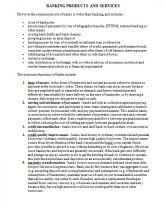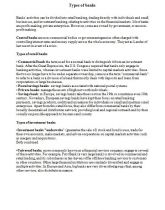Referát: Types of banks (retail banks, investment banks, bonds, sotcks...)
Skryť detaily | Obľúbený- Kvalita:81,5 %
- Typ:Referát
- Univerzita:Technická univerzita v Košiciach
- Fakulta:Ekonomická fakulta
- Kategória:Jazyky
- Podkategória:Angličtina
- Predmet:Anglický jazyk
- Autor:janni20
- Ročník:2. ročník
- Rozsah A4:4 strán
- Zobrazené:1 473 x
- Stiahnuté:9 x
- Veľkosť:0,1 MB
- Formát a prípona:MS Office Word (.doc)
- Jazyk:anglický
- ID projektu:13713
- Posledna úprava:10.06.2021
Banks' activities can be divided into retail banking, dealing directly with individuals and small businesses, and investment banking, relating to activities on the financial markets. Most banks are profit-making, private enterprises. However, some are owned by government, or are non-profit making.
Central banks are non-commercial bodies or government agencies often charged with controlling interest rates and money supply across the whole economy. They act as Lender of last resort in event of a crisis.
Types of retail banks
• Commercial bank the term used for a normal bank to distinguish it from an investment bank. After the Great Depression, the U.S. Congress required that banks only engage in banking activities, whereas investment banks were limited to capital markets activities. Since the two no longer have to be under separate ownership, some use the term "commercial bank" to refer to a bank or a division of a bank that mostly deals with deposits and loans from corporations or large businesses.
• Postal savings banks: savings banks associated with national postal systems.
• Private banks: manage the assets of high net worth individuals.
• Savings bank: in Europe, savings banks take their roots in the 19th or sometimes even 18th century.
...
Central banks are non-commercial bodies or government agencies often charged with controlling interest rates and money supply across the whole economy. They act as Lender of last resort in event of a crisis.
Types of retail banks
• Commercial bank the term used for a normal bank to distinguish it from an investment bank. After the Great Depression, the U.S. Congress required that banks only engage in banking activities, whereas investment banks were limited to capital markets activities. Since the two no longer have to be under separate ownership, some use the term "commercial bank" to refer to a bank or a division of a bank that mostly deals with deposits and loans from corporations or large businesses.
• Postal savings banks: savings banks associated with national postal systems.
• Private banks: manage the assets of high net worth individuals.
• Savings bank: in Europe, savings banks take their roots in the 19th or sometimes even 18th century.
...


